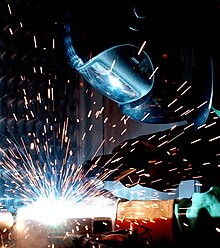weld
English


Pronunciation
Etymology 1
From Middle English welde, wolde, from Old English *wielde, *weald, from Proto-Germanic *walþijō, *walþō (compare Dutch wouw, Middle Low German walde, wolde, French gaude), from Proto-Germanic *walþuz (“forest”). More at wold.
Alternative forms
Noun
weld
- A herb (Reseda luteola) related to mignonette, growing in Europe, and to some extent in America, used to make a yellow dye.
- The yellow coloring matter or dye extracted from this plant.
Synonyms
- (Reseda luteola): dyer's rocket; dyer's weed; wild woad
Translations
|
|
Etymology 2
Alteration of well (“boil, rise”), probably influenced by the past participle, welled.
Verb
weld (third-person singular simple present welds, present participle welding, simple past and past participle welded)
- (transitive) To join two materials (especially two metals) together by applying heat, pressure and filler, either separately or in any combination.
- (transitive) To bind together inseparably; to unite closely or intimately.
- 1847: Alfred Lord Tennyson, The Princess
- Now should men see / Two women faster welded in one love / Than pairs of wedlock.
- 1847: Alfred Lord Tennyson, The Princess
Derived terms
Translations
|
|
Noun
weld (plural welds)
- The joint made by welding.
- The state of being welded.
- The template Template:rfex does not use the parameter(s):
2=Not sure this is real, but was in MW 1913; couldn't find a cite for "in weld" on b.g.c. through 1913
Please see Module:checkparams for help with this warning.(Can we add an example for this sense?)
- The template Template:rfex does not use the parameter(s):
Derived terms
See also
Etymology 3
This etymology is incomplete. You can help Wiktionary by elaborating on the origins of this term.
Verb
weld (third-person singular simple present welds, present participle welding, simple past and past participle welded)
- (transitive, obsolete) To wield.
- 1485: Sir Thomas Malory, Le Morte D'Arthur, p. 168 line 2 (Sommer edition)
- [Arthur says to a wicked giant] "he that alle the world weldeth gyue the ſorte lyf & ſameful dethe" ("He who wields all the world gives thee short life and shameful death")
- 1485: Sir Thomas Malory, Le Morte D'Arthur, p. 172 line 2 (Sommer edition)
- [Arthur says to conquering knights] "ye be worthy to welde all your honour and worship"
- (Can we find and add a quotation of Edmund Spenser to this entry?)
- 1485: Sir Thomas Malory, Le Morte D'Arthur, p. 168 line 2 (Sommer edition)
References
- “weld”, in Webster’s Revised Unabridged Dictionary, Springfield, Mass.: G. & C. Merriam, 1913, →OCLC.
Anagrams
Central Franconian
Alternative forms
- well (chiefly Moselle Franconian)
Etymology
From Old High German wildi, from Proto-Germanic *wilþijaz.
Pronunciation
Adjective
weld (masculine welde or welle, feminine weld or well, comparative welder or weller, superlative et weldste)
Usage notes
- The traditional inflected forms are those with -ll- in all dialects. Those with -ld- are now predominant, however, in many dialects under standard German influence.
Welsh
Pronunciation
Verb
weld
Mutation
- English 1-syllable words
- English terms with IPA pronunciation
- English terms with homophones
- Rhymes:English/ɛld
- English terms inherited from Middle English
- English terms derived from Middle English
- English terms inherited from Old English
- English terms derived from Old English
- English terms inherited from Proto-Germanic
- English terms derived from Proto-Germanic
- English lemmas
- English nouns
- English countable nouns
- English nouns with unknown or uncertain plurals
- English verbs
- English transitive verbs
- English terms with obsolete senses
- Requests for quotations/Edmund Spenser
- en:Brassicales order plants
- en:Herbs
- Central Franconian terms inherited from Old High German
- Central Franconian terms derived from Old High German
- Central Franconian terms inherited from Proto-Germanic
- Central Franconian terms derived from Proto-Germanic
- Central Franconian terms with IPA pronunciation
- Central Franconian lemmas
- Central Franconian adjectives
- Ripuarian Franconian
- Welsh terms with IPA pronunciation
- Welsh non-lemma forms
- Welsh mutated verbs
- Welsh soft-mutation forms